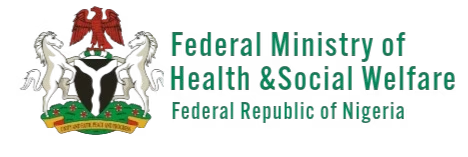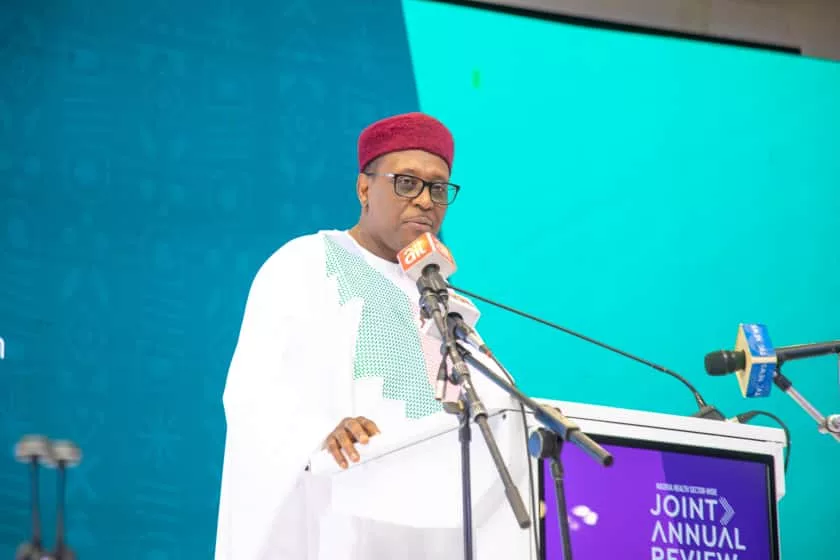Abuja-Nigeria
The Federal Government of Nigeria has declared significant progress in its ongoing health sector reform, revealing that 84 percent of the key performance indicators under the Presidential Health Sector Renewal Investment Compact have been achieved as of the third quarter of 2025.
Coordinating Minister of Health and Social Welfare, Professor Muhammad Ali Pate CON, disclosed on Wednesday at the opening of Nigeria Health Sector-Wide Joint Annual Review 2025. Themed “All Hands, One Mission,Bringing Nigeria’s Health Sector to Light.”
Prof. Pate commended President Bola Ahmed Tinubu for his “incredible vision and decisive leadership” in transforming the country’s health system, saying Nigeria is witnessing “a new era of accountability, performance, and citizen-focused health delivery.”
“Years from now, when the story of this period is written, President Tinubu’s leadership at this critical moment will stand as one of its most glorious chapters,” he stated. “Under his guidance, the sector is moving from fragmented, donor-led programming to coherent, nationally owned systems driven by measurable results.”
According to the Minister, 35 of the 36 states and the FCT have conducted their Joint Annual Health Reviews and Performance Dialogues, fully aligning their operational plans with the National Health Sector Strategic Blueprint.
He noted that all 774 local government areas now have National Health Fellows and Public Financial Management Officers, surpassing federal targets, while 72 percent of states have functional coordination mechanisms to tackle non-communicable diseases such as hypertension and diabetes.
The review highlighted measurable declines in mortality rates. Maternal deaths have dropped by 17 percent, while newborn deaths have reduced by 12 percent across 172 high-burden local government areas targeted under the Miyami Model.
Skilled birth attendance coverage has increased by 33 percent, and over 4,000 free caesarean sections have been performed in National Health Insurance Authority (NHIA)-empanelled facilities.
“By including emergency obstetric care under the national insurance benefit, we have removed one of the key barriers preventing women from accessing lifesaving care,” Pate stated.
Data presented at the review showed a surge in the utilization of primary health care facilities nationwide. Visits to Basic Health Care Provision Fund (BHCPF) facilities rose from 10 million in early 2024 to 45 million by mid-2025 — a sign of renewed public confidence.
Deliveries attended by skilled birth attendants now exceed 90 percent, while antenatal care and family planning coverage have also improved significantly. Vaccination coverage for key antigens has met most targets, and the introduction of the HPV vaccine was described as a “global milestone” for Nigeria’s immunization drive.
Results from nationwide perception surveys show growing public confidence in the government’s health reforms. Fifty-five percent of Nigerians now express confidence in the overall direction of the health system, while 67 percent believe the government is better equipped to handle health emergencies.
However, affordability remains a key concern among citizens. Pate disclosed that plans such as the Medical Relief Programme and expanded social health protection schemes are underway to reduce out-of-pocket expenses and increase financial access to care.
Speaking, the Honourable Minister of Finance and Coordinating Minister of the Economy, Mr Wale Edun said the 2025 Federal health budget rose nearly 60 percent, with the BHCPF increasing from ₦131.5 billion in 2024 to almost ₦299 billion in 2026, and health’s share of the national budget rising to 5.2 percent from just over 3 percent.
“The turnaround in the economy has begun. Distortions are being removed, the economy is stabilizing, and social sectors like health are benefiting significantly,” he stressed, urging States and Local Governments to channel more of their increased revenues into health and education.
On his part, the Honourable Minister of State for Health and Social Welfare, Dr. Iziaq Adekunle Salako, said the Renewed Hope Agenda is transforming Nigeria’s health sector, with infrastructure, workforce, and system reforms underway.
“The Renewed Hope Agenda is not just a promise, it is a covenant to safeguard the health of our people,” he stated, disclosing over 500 new high-impact projects, 13 tertiary health institutions, six cancer centres of excellence, and 21 strategic policies driving health system reforms.
He added that primary healthcare revitalisation and digital health initiatives are connecting thousands of facilities, improving access and accountability. According to him, full implementation of the National Health Sector Renewal and Investment Initiative (NHSRII) could save ₦4.8 trillion annually from preventable diseases and retain ₦850 billion currently lost to medical tourism.
Dr. Salako urged State Governments to increase counterpart funding for the BHCPF, expand insurance coverage, and strengthen primary healthcare delivery, while calling on development partners and private investors to align with national priorities.
On Commitment to Health Financing, Recruitment & Welfare
Prof. Pate emphasized the federal government’s commitment to sustainable health financing, local manufacturing of medicines and vaccines, and innovative funding through fiscal measures on sugar-sweetened beverages and public-private partnerships. He announced that over 20,000 new frontline health workers have been recruited into federal tertiary hospitals, with ₦50 billion approved to address arrears and allowances across cadres.
“Our call to all health workers is simple,” the Coordinating Minister said. “Put the Nigerian person at the centre of attention. If we do that, all other issues can be resolved.”
On Expansion of Health Sector Renewal Compact
The highlight of the three-day event was the expansion and endorsement of the Health Sector Renewal Compact by Local Governments, traditional rulers, private sector leaders, and civil society groups — a pact first signed in 2023 by the Federal Government, States, and international development partners.
In closing, Professor Pate reaffirmed that the Tinubu administration’s approach, built on transparency, collaboration, and local accountability, is reshaping Nigeria’s health landscape.
“We are not merely reforming the health sector,” he declared. “We are restoring confidence, rebuilding systems, and renewing hope for every Nigerian family.”
Alaba Balogun
Deputy Director/Head, Information
& Public Relations
13 November 2025




